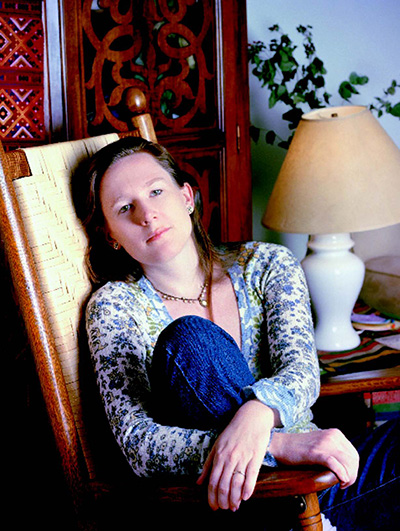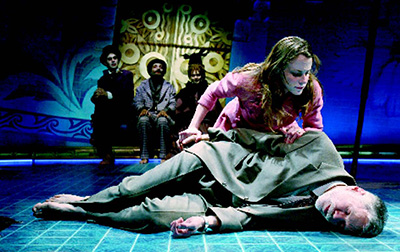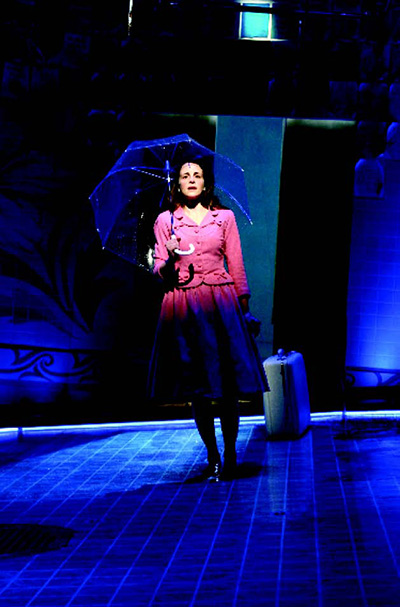The sophomore who showed up for playwright Paula Vogel’s class was quiet, withdrawn, and suffering from writer’s block. “She was just sitting back and taking everything in,” is how Vogel remembers Sarah Ruhl ’97, ’01 MFA. But Vogel didn’t pry. Actually, she didn’t need to. What was bothering Ruhl would soon come out indirectly in her writing.

The assignment Vogel gave her was to write a play where the protagonist was a dog. “Paula felt I needed something with a different angle, a different way in,” Ruhl recalls. She turned in a one-act drama about a pooch who waits for his master to return from a trip. Gradually, the audience realizes the master is never coming home. He’s dead. The actor playing the dog was to suggest the depths of the animal’s sense of loss through movements borrowed from Japanese kabuki theater.
When Vogel read the script at her home in Providence, she raced to find her partner, Brown biology professor Anne Fausto-Sterling. “This is incredible. You’ve got to hear this,” Vogel told her. When Vogel was done reading the work aloud, both women were weeping. It was a remarkable anthromorphic portrait of the no man’s land we occupy when a loved one falls ill. You wait and wait, hoping for a recovery, yet sensing, and at some level knowing, there won’t be one.
Only a few months earlier, on August 14, 1994, Ruhl’s father had passed away. He had been battling cancer for the last two years. He was fifty. Vogel herself was well acquainted with the toll taken by grief and mourning. She had lost her own brother to AIDS in the late 1980s.
In her senior year, Ruhl sought out Vogel to be her thesis advisor. Oddly enough, Ruhl proposed working together on a research paper on the Victorian novel. Vogel said she would love to work with Ruhl, however literary criticism wasn’t her area of expertise. But if Ruhl wanted to write another play.… Ruhl thought it over for a bit, then agreed wholeheartedly.
Vogel prefers not to intrude into her students’ private lives. But Ruhl still describes her as a “surrogate parent,” and the Pulitzer-prize winning Vogel did have some advice to offer based on her experience with her brother. “The greatest gift you’ll ever receive as a writer,” she told Ruhl, “is the death of your father.”
You could say Ruhl is our playwright laureate of grief, but even that does not quite do her work justice. “Her plays limn the space between life and death,” says Curt Columbus, the artistic director of Providence’s Trinity Repertory Company theater, which is staging Ruhl’s The Clean House in April. By this he means that she has a unique ability to depict the bereaved as they struggle to find a balance between going on and remembering. In Dead Man’s Cell Phone, which is set to premier in Washington, D.C., this summer, a lonely woman finds the cell phone of a recently deceased stranger. She finds herself fielding calls from his friends and relatives, who still don’t know he has died.
When I first meet Ruhl in early November, she is cresting on a tsunami-sized wave of success. Two months earlier, she was awarded a MacArthur Foundation genius award, which besides bringing enormous prestige comes with a not-too-shabby half-million dollars that Ruhl can spend any way she pleases. Shortly after that, Eurydice, her adaptation of the Orpheus myth, opened at Yale Repertory Theater in New Haven just as her comedy, The Clean House, a finalist for the 2005 Pulitzer prize, began a sold-out run at New York City’s Lincoln Center. A reviewer for the New York Times called Clean House “one of the finest and funniest new plays you’re likely to see in New York this season.” And Ruhl is only thirty-three.
“I don’t know what to make of all this,” she says. “I haven’t done any animal sacrifices. I haven’t made any Faustian bargains. I don’t know why the theater gods are choosing to smile on me right now.”
Ruhl is small, and wears her strawberry blond hair pulled back to reveal a pale oval face. On the day I visit, her taste in clothes veers toward the frump—baggy jeans and a flower-print vest, no make-up. After graduate school at Brown, where she again studied with Vogel, she lived in New York, Chicago, and Los Angeles, but has now returned to Manhattan and resides with her husband, Tony Charuvastra ’96 MD ’02, who is currently doing a fellowship at the New York University School of Medicine in child psychiatry. The couple met while doing their graduate work at Brown, and were married on a mountaintop outside Los Angeles. Vogel and Fausto-Sterling acquired a temporary license so they could perform the ceremony. (This is legal in California).
Modest and quiet-spoken, Ruhl doesn’t look the part of theatrical superstar, but as you spend time with her you quickly realize she possesses a rock-solid sense of herself and absolute confidence in her talents. She has worked with some of the most famous directors and producers in American theater and has consistently held her own. She says she’s never thrown a tantrum, but has occasionally walked out of rehearsal to protest a director’s decision. “The amazing thing about Sarah,” says Columbus, “is how gentle and genuine she is. She’s just this very sweet yet forceful personality.”

Ruhl’s plays are a combination of the avant-garde, Greek myth, lyrical poetry, and magical realism, with a smattering of vaudeville and German expressionism thrown in. It’s a blend that could easily give way to postmodern obscurantism, except that Ruhl has a big heart. In play after play, she manages to pull off an impossible balance: Yes, the plays feature characters who turn into almonds, elevators in which it rains, plots that eschew the linear, and jokes told in Portuguese. But the dramas are also funny, eminently accessible, and Chekhovian in their depiction of human weakness and fallibility. The MacArthur Foundation, in naming Ruhl one of its 2006 fellows, described her as a “playwright creating vivid and adventurous theatrical works that poignantly juxtapose the mundane aspects of daily life with mythic themes of love and war.” Columbus says Ruhl’s work is like “watching T.S. Eliot’s poetry brought alive with images in a theater.”
Vogel compares Ruhl to Virginia Woolf. She sees Ruhl, like Woolf, as “a singular voice in a woman’s body that has her own planet, that inhabits a planet that is part of our world, but not wholly part of it either.” Vogel predicts Ruhl will usher in a new era in American theater in which playwrights forsake the irony and abstruse language games of postmodernism and return to the themes and issues that preoccupied the Greeks—love, war, death, grief, and joy. “Sarah is going back to an older time when theater was designed to be a conversation between the actor and the audience about human mortality,” she says. “And I think Sarah will jumpstart a whole theatrical movement in that direction.”
For the time being, Ruhl seems largely unfazed by the success and hoopla surrounding her. She has a six-month-old daughter, Anna, whom she carries to rehearsals in a Baby Bjorn (Anna, who has been given her own little dressing room, usually stays in the hallway with a sitter).Though Ruhl’s phone rings constantly with offers from theaters to produce her work and despite rehearsals that run late into the night, Anna, says Ruhl, “keeps me grounded in the moment.”
On his deathbed, Ruhl’s father, a marketer for a toy company in Chicago, joked about bodily functions. She remembers one crack in which he warned that his urine might be radioactive from all the experimental medicine he was taking. He may have been terrified and anguished during his final days, Ruhl says, but he tried as much as possible to “put everyone at ease.” She remains in awe of him for this. “It took a very specific kind of bravery,” she says, “to retain his sense of humor.”
After he died, Ruhl found herself unable to read. “I would pick up something and read the same paragraph over and again,” she says. She also remembers, “The world felt physically darker. I didn’t feel like there was much light.” She returned to Brown to finish her degree in English and American literature, but had little enthusiasm for her studies: “I was just devastated.”
Ruhl was at a loss how to grieve for her father. She was raised Catholic, but had abandoned the Church as a teenager after she’d decided it was unfair that priests, but not nuns, were the only ones allowed to communicate directly with God. Her friends had no idea what it’s like to lose a parent when you are about to turn twenty. By necessity, she says, writing became her salvation. “There’s a lack of ritual in the grieving process in our culture, and I missed having that,” she says. “I turned to writing as a way to find that missing ritual.”

Here, having decided to stay forever with her dead father, Eurydice arrives in the underworld with her suitcase.
As a start, she began work on a play based on the Greek myth of Orpheus. In the original version, Orpheus, a gifted musician, refuses to move beyond his grief for his dead wife, Eurydice, and journeys to the underworld to find her. In Ruhl’s Eurydice, the wife is grappling with her grief over the loss of her father. The play opens on Eurydice’s and Orpheus’s wedding day. The bride-to-be is worrying that her marriage will be a betrayal of her dead father. “A wedding,” Eurydice notes, “is for a father and a daughter. They stop being married on that day.” But however long her father has been dead, Eurydice is still not ready for such a separation.
In Ruhl’s play it’s Eurydice, not Orpheus, who journeys to the underworld, where she is reunited with her father. Orpheus begs his bride to return to the realm of the living, but in the end she chooses to stay. When Yale Repertory Theatre staged the play last fall, the underworld was a giant bathhouse covered in turquoise tiles. The language in Eurydice runs the gamut from quirky to lyrical. The lord of the underworld wears black leather and gets around in a souped-up tricycle.
Despite these strange details, there was no getting around how dark and disturbing the play is. This is Ruhl saying that grief is insurmountable. The dead have a grip on the living that can never be broken. Eurydice is “from a darker time in my life,” Ruhl says. “I remember writing the play and feeling very sad afterward.”
Two years later—enough time, Ruhl says, “that I was able to let go of some of the grief”—she began what would become her breakthrough hit, The Clean House (Ruhl is immensely prolific; she has written five plays in the last decade). She actually started thinking about the play when she was a grad student at Brown. She happened to be at a party with her husband when she overheard a woman say, “Oh, it’s been such a hard month. My cleaning lady from Brazil decided not to clean my house because she’s depressed. I took her to the hospital and had her medicated, but she still won’t clean.”
Playwrights thrive on those snippets of overheard dialogue that reveal oceans about a person’s character, and this was one of them. It was not just the classism and cruelty of the remark. It was that so much of the woman’s self-identity seemed to depend on her not being the one who cleaned her own house.
For Ruhl, the remark triggered a lengthy period of reflection on women, order, chaos, and house cleaning. Her grandmother kept a very cluttered house—“She saved everything, even little bits of lipstick or Kleenex that were half used,” Ruhl says—but made sure all this detritus was kept out of view of the guests. “There was a neat public face she presented to the world, but in private, it was complete chaos,” Ruhl recalls.
Ruhl herself is happy to put away laundry, but hates washing it. “I’m sure an analyst would have a field day with that,” she jokes. Then there was the mother of a friend who wouldn’t use a phone unless she had first wiped off the mouthpiece with a Wet One. “I thought, ‘My God, this woman can’t stand the thought of being in contact with someone else’s germs for two minutes,’” Ruhl recalls. “But as I understand it, the world is covered in tiny bits of excrement. To what extent can you deal with it?”
The result of these ruminations was The Clean House, which became a smash hit in regional theaters across the country before moving—very belatedly—to New York last fall. In the play, Lane is a prominent Connecticut doctor whose maid, Matilde, has become too depressed to clean. Lane’s sister, Virginia, a neat freak, is more than happy to fill in for Matilde so long as it’s kept a secret from her sibling. The play has some truly hilarious and loopy moments, but it is ultimately a serious dissection of class, cleanliness, and gender.
It is also about grief. Lane’s husband, Charles, is a cancer specialist who falls in love with a patient named Ana while performing her mastectomy. He goes off to Alaska to find a yew tree whose bark he believes can cure her—somehow it all makes sense in the context of the play—while Ana moves in with the two sisters. Ana’s death brings the sisters and their maid together. This time around, grief is good—devastating, yes, but also, when overcome, capable of spurring profound and uplifting transformation. As Laura Kepley ’05 MFA, who is directing Clean House at Trinity Rep, puts it, “Sarah understands so beautifully and so movingly and with humanity how we somehow manage to go on.”
On Ana’s deathbed, the maid, Matilde, tells a joke. Ana finds it hysterical. Just like Ruhl’s father, Ana dies laughing.
These days Ruhl is busy revising what could just turn out to be her masterpiece, although at this point she prefers to think of it as an “epic that people won’t mind sitting through even if the seats are hard.” It is called Passion Play, a cycle, and runs around three-and-a-half hours. Each of the play’s three acts takes place in a different historical period and place—sixteenth-century England, 1930s Germany, and the United States in the 1980s—and tells the story of an acting troupe trying to stage the story of Christ’s crucifixion. This time her subject isn’t grief but the intersection of politics, religion, history, and art. Ruhl had originally written it to be staged over two nights and to last more than four hours, but Arena Stage in Washington, D.C., where it was produced in the fall of 2005, persuaded her to shorten it. The Arena production got mixed reviews, and the Goodman Theatre in Chicago, which is interested in staging Passion Play, has asked for a rewrite.
Rehearsals for a possible show at the Goodman begin, oddly enough, in the basement of Lincoln Center. Mark Wing-Davey, the revered British director who wants to oversee the Chicago production, happens to be in New York, and he suggests that he, Ruhl, and a group of actors get started. Wing-Davey is a big, burly man, and sitting next to Ruhl in the rehearsal room, he dwarfs her in their adjacent folding metal chairs.
Wing-Davey, who in addition to directing Shakespeare and the playwrights José Rivera and Caryl Churchill also played the two-headed Galactic President, Zaphod Beeblebrox, in the radio and TV versions of The Hitchhiker’s Guide to the Galaxy, has a unique rehearsal process. He asks his actors to go out and research certain subjects pertinent to the play they’re working on—today it’s Elizabethan England—and then present what’s basically a book report to the group.
He also dispatches his cast to interview real-life people about their experiences. Since the third act of Passion Play features a Vietnam vet suffering from post-traumatic stress disorder, one of the actors has spent considerable time interviewing a soldier who has just returned from Iraq. He pretends to be the marine as other cast members ask him impromptu questions. It’s hard at times to see how all this is relevant to Ruhl’s work, but Wing-Davey says it doesn’t need to be. He is, he says, “laying mulch for the creative process.”
As is her wont, Ruhl sits quietly through rehearsal, occasionally chiming in with a thought or question. She seems largely unfazed by everything that’s going on around her, and later when I ask her why, she says it’s because she’s not really sure Passion Play needs all that much revision. “It’s mostly there,” she says. “It just needs some cuts and restructuring, rather than a whole new draft.”
While she’s been in a rehearsal, a nanny has been wheeling Ana around the warren of hallways that make up the theater’s basement. But now Ana needs to be nursed, and Ruhl goes to it. At this moment her reluctance to revise seems part of an equanimity that her success and her new daughter have brought to her. She stops admiring Ana’s bucolic face for a moment and says, “Things are better than I could ever have imagined right now. I’d be totally content if they stayed this way for a while.”
Lawrence Goodman is the BAM’s senior writer.




